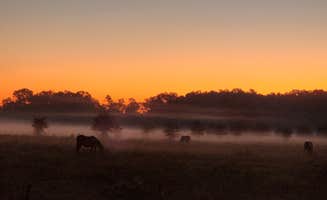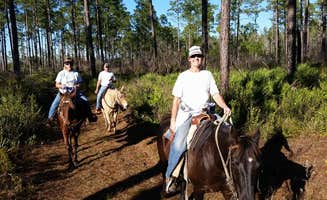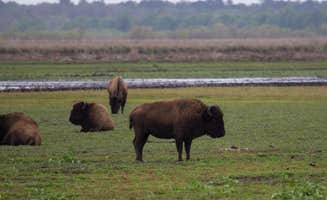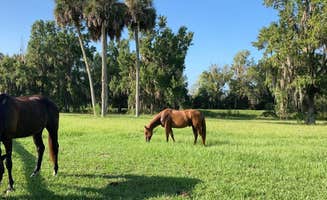Trenton, Florida sits within the Suwannee River basin where natural springs bubble up through limestone karst terrain. The area features a mix of hardwood forests and open grasslands with elevations ranging from 40-70 feet above sea level. Summer temperatures regularly exceed 90°F with high humidity, while winter nights can drop into the 40s, creating ideal camping conditions from October through April.
What to do
Wildlife viewing trails: Paynes Prairie Preserve State Park offers unique wildlife viewing opportunities with multiple observation points. "From the grasslands to the marshes, Paynes is truly one of a kind," writes Issa F. "Go hiking, biking, kayaking, or fly a kite. Backcountry camping is first come first serve—get there early to get a permit."
Spring swimming: Lafayette Blue Springs State Park provides refreshing spring swimming in 72°F water year-round. "Beautiful spring for swimming featuring a limestone bridge way you can snorkel under. If you're into diving they also have an underwater cave, just make sure to check in with the ranger station 2 miles north before diving," notes Aubrey O. The swimming area includes natural limestone formations and crystal-clear water visibility.
Equestrian trails: Several dedicated horse campgrounds near Trenton, Florida offer direct access to extensive trail systems. At Goethe Trailhead Ranch Campground, campers appreciate the peaceful setting. "We picked a spot overlooking the back horse field and what an amazing view! The morning sunrise is beautiful and the evening the sky disappears into the earth," shares Rob V.
What campers like
Quiet, dark skies: The forested campgrounds provide excellent stargazing opportunities with minimal light pollution. At Paynes Prairie Preserve State Park Campground, Joe R. notes: "Great location with plenty of dark skies. The spots are well spaced in the woods, with plenty of room."
Wildlife encounters: The region's diverse ecosystems support abundant wildlife viewing opportunities. "We were able to see wild horses, bisons, snakes and gators. Great for fishing and kayaking," reports Brenda S. about her experience at Paynes Prairie State Park.
Clean facilities: Most state parks maintain well-kept bathroom facilities. At O'Leno State Park, Chris A. reports: "Facilities are clean, albeit old. Camping loops and pads are hard sand. Sites vary in size and level."
Natural springs access: Many campsites offer walking distance access to natural springs. "The spring itself is cold and dark," notes Kat A. about Manatee Springs State Park Campground, adding that "night walks down to the pier are a must."
What you should know
Pet restrictions on trails: While dogs are allowed in most campgrounds, many wildlife viewing trails prohibit pets. Denise mentions this limitation at Paynes Prairie: "The biggest disappointment for this state park is that all of the things they advertise - bison, horses, wildlife - are all on trails where pets are not allowed."
Seasonal water conditions: Spring clarity can vary based on river levels. Lafayette Blue Springs State Park staff advise checking conditions before visiting: "If your main purpose for visiting is to swim in the spring make sure to call ahead or go online and check water conditions as this spring is attached to the Suwanee river and can sometimes be 'browned out' due to river levels."
Accessibility challenges: Some facilities have limited accessibility options. At Manatee Springs, Sara R. notes: "I have trouble walking. I'm at site 38 and no handicap parking for showers. The shower doors and walls are nasty."
Insect protection: The humid environment supports active mosquito populations. Lauren W. reports from her October visit to Paynes Prairie: "Nice campground. Clean and well maintained. Very shady site, but tons of mosquitoes."
Tips for camping with families
Ranger programs: Take advantage of educational opportunities led by park staff. At O'Leno State Park, one visitor participated in "the Ranger led hike which was really nice, my 5 year old struggled to keep up with the Ranger and there are decent elevation changes."
Wildlife safety: Establish clear rules for children around water bodies where alligators may be present. Shelly S. notes at O'Leno: "I travel with my three amigos (Pomeranian, Dachshund and Australian Cattledog) and was on high alert as soon as we entered the park. This is the type of park where the wildlife will chase and eat them instead of the other way around."
Rental equipment: Many parks offer kayak and canoe rentals for family water exploration. At Manatee Springs, Kat A. shares: "They do rent a tandem kayak around $50 for 2 hours. Brings cash to the concession to avoid paying card fee of a few dollars per transaction."
Swimming areas: Natural spring swimming holes provide family-friendly water recreation with varying depths. At Lafayette Blue Springs State Park, Shea A. appreciated "swimming in crystal clear spring water just steps away" from the tent sites.
Tips from RVers
Site surfaces: Most campgrounds feature sand or dirt pads that may become uneven. Chris A. notes at O'Leno State Park: "Camping loops and pads are hard sand. Sites vary in size and level. Separation between sits is not bad but suffered in hurricane damage."
Low-clearance challenges: Some campground roads have overhanging tree branches. At O'Leno, Chris A. warns: "Some sites appear a bit tight with overhanging trees."
Hookup availability: Check for full-hookup availability when booking. Dave D. recommends Manatee Springs: "Peaceful secluded campsites. Most have a wooded buffer. There are full hookup sites available."
Cell service limitations: Expect limited connectivity at most natural area campgrounds. Laura M. reports from Manatee Springs: "Poor/spotty cell service in park, but there's free wifi at the concession stand."





